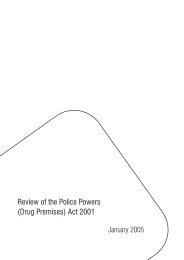Crimes (Forensic Procedures) Act 2000 - NSW Ombudsman - NSW ...
Crimes (Forensic Procedures) Act 2000 - NSW Ombudsman - NSW ...
Crimes (Forensic Procedures) Act 2000 - NSW Ombudsman - NSW ...
You also want an ePaper? Increase the reach of your titles
YUMPU automatically turns print PDFs into web optimized ePapers that Google loves.
4.2.1. How easy is it for police officers to comply with the <strong>Act</strong> and SOPs<br />
In our survey, we asked local area commands how easy it is to comply with the legislation and SOPs. About half the<br />
commands said it was easy, and about half said it was difficult. 271 Only three commands said it was very easy, and<br />
only one said it was very difficult.<br />
Commands which had difficulty complying with the SOPs generally said there are too many to choose from. As<br />
discussed above, there are 18 different SOPs, depending on the type of procedure and attributes and circumstances<br />
of the person being tested. While this may appear daunting for officers, we note that the SOPs have been designed<br />
to maximise compliance with the legislation. To assist officers in selecting the correct SOPs, FPIT have included on<br />
their intranet site separate flowcharts on how to select appropriate SOPs. Separate flowcharts have been established<br />
for suspects, volunteers and procedures conducted in accordance with a court order. Once the appropriate flowchart<br />
has been selected, the officer can then use this to select the SOPs suitable to the status of the individual undergoing<br />
the procedure. The SOPs then take the officer through the process of conducting the forensic procedure and provide<br />
prompts at each step within the process. In our view, this is the best way to ensure officers who are not familiar with<br />
the <strong>Act</strong> meet their legislative obligations.<br />
Over half of local area commands advised they had experienced problems with the <strong>Act</strong>. These related to:<br />
• the complexity of the legislation<br />
• difficulty arranging interview friends and independent persons for suspects and volunteers<br />
• having to obtain court orders to conduct forensic procedures on children and the length of time it takes to<br />
obtain an order<br />
• the length and complexity of the information sheet<br />
• having to record forensic procedures on video<br />
• sharing samples with suspects<br />
• conducting procedures within the time limits specified in the <strong>Act</strong><br />
• difficulty transporting DNA samples to the lab for analysis (both metropolitan and regional commands made<br />
this comment)<br />
• delays in obtaining DNA analysis results, and<br />
• difficulty of obtaining DNA information from interstate.<br />
We have addressed these issues in detail in the relevant parts of this report.<br />
4.2.2. Impact of forensic procedure powers on police practice<br />
The power to conduct forensic procedures has had a significant impact on the way police investigate and prosecute<br />
crime. <strong>Forensic</strong> procedures are conducted in every local area command in New South Wales, and some specialist<br />
commands as well, in relation to offences ranging from minor property offences through to the most serious types of<br />
crime. Police officers regard the power to conduct forensic procedures as extremely useful:<br />
It’s a fantastic investigative tool – it’s already had a huge impact, it’s the greatest step forward in investigation<br />
since finger printing. 272<br />
It’s a great power, which police should have had ages ago. 273<br />
Some officers advised they consider using their power to conduct forensic procedures as a matter of course:<br />
Generally I refer, consider or use the <strong>Forensic</strong> <strong>Procedures</strong> <strong>Act</strong> with every arrest and/or investigation I<br />
undertake. 274<br />
Instead of asking, ‘Why should I do this procedure’, police should be asking themselves, ‘Why shouldn’t I do<br />
this procedure... Buccal swabs should be part and parcel of the charge process... We’re getting everyone<br />
accredited and trying to encourage officers to take a buccal swab where they can. 275<br />
44<br />
<strong>NSW</strong> <strong>Ombudsman</strong><br />
DNA sampling and other forensic procedures conducted on suspects and volunteers under the <strong>Crimes</strong> (<strong>Forensic</strong> <strong>Procedures</strong>) <strong>Act</strong> <strong>2000</strong>

















